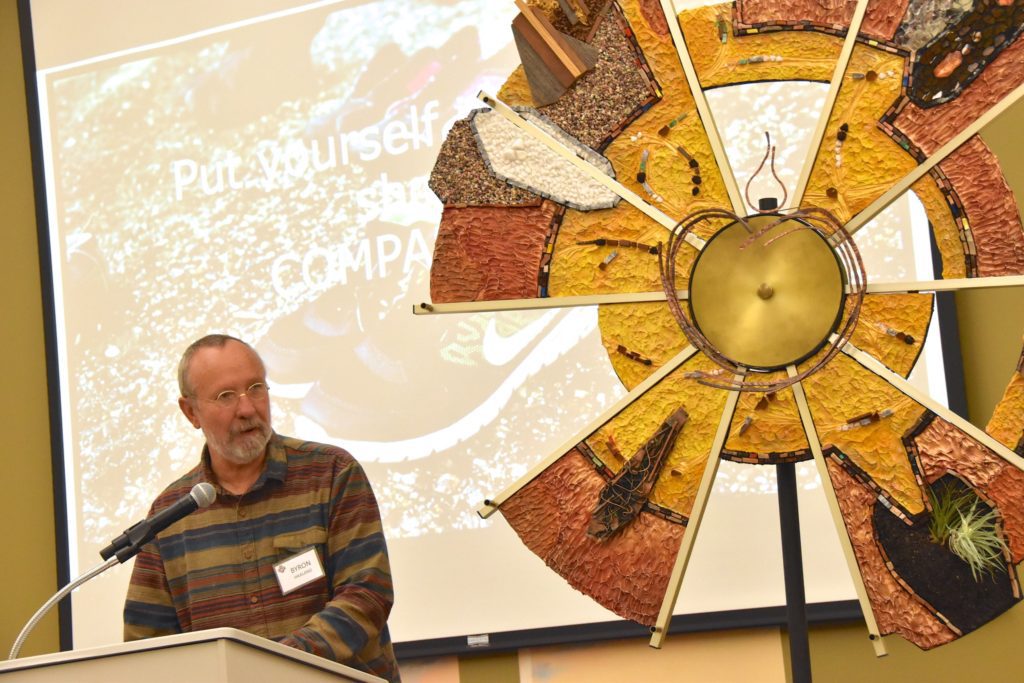PHOTOS: click here to view photos from the assembly
“Interculturality: Together in Christ” was the theme of the June 11-14, 2019 Provincial Assembly. On the surface, it was a reference to the increasing internationality of the SCJ presence in North America. But the theme moved far beyond the idea of SCJs simply living, praying and ministering together as people from different countries.
“Welcome” or “hospitality” was the wider theme that wound its way throughout the week’s activities. It started with the welcome of former SCJs and students who were invited to come together June 10-11 at Sacred Heart Seminary and School of Theology for a reunion. Reunion participants joined SCJs – many of them former classmates – at the Monday evening Jubilee Celebration. They were also present for the first session of the Assembly. Led by former SCJ Tom Tucker, participants from both the Former SCJ Reunion and the Province Assembly reflected on a common theme in their lives: the impact of Fr. Leo John Dehon and his charism.
“The SCJs helped me to see a bigger world, a world with greater needs than I ever realized,” said a former member of the community. “The SCJs helped me to see with my heart, they helped me to see what is really important.”
“Social justice,” said another. “I heard Fr. John Czyzynski speak of it yesterday. Many of us have devoted our professional and personal lives to social justice because of the impact of our association with the SCJs, with the Dehonian charism.”
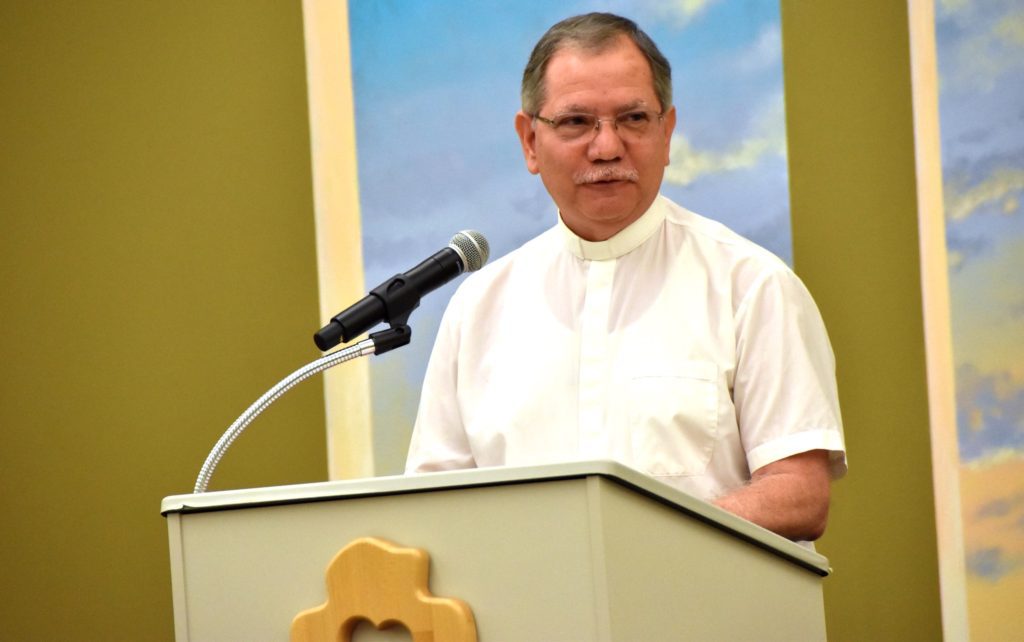
Seeking to create unity in diversity
Fr. Raúl Gomez Ruiz, SDS, the newly appointed president-rector of Sacred Heart Seminary and School of Theology, spoke of his vision of forming students who welcome others, who live the welcoming love of Christ. They are students “who not only have a healthy relationship with Christ but who also are in touch with their humanity in a healthy way, who are capable of understanding and responding to the human condition with compassion, and with the Heart of Christ,” he said.
“I see them as persons who are able to love others because they themselves have been loved,” he continued. “I see them as persons who are able to treat others as they wish to be treated. I see them as persons who are able to create unity in diversity as expressed in the SCJ motto Cor Unum.
Click here to read Fr. Raúl’s full text.
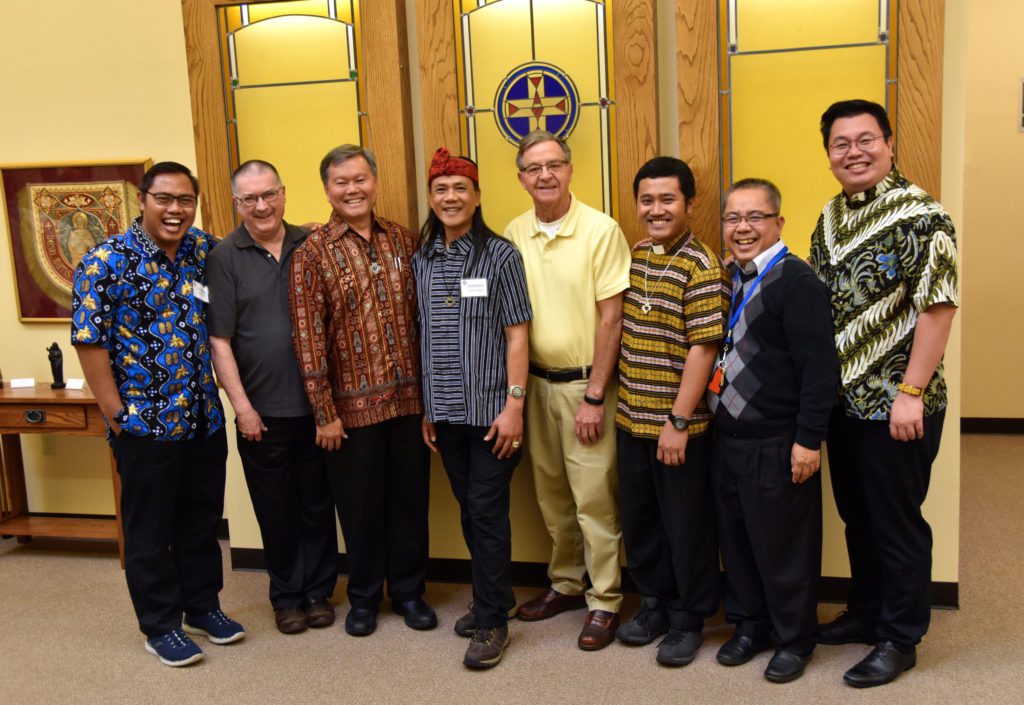
Welcoming the migrant
“We are many parts, we are all one body, and the gifts that we have, we are given to share. May the Spirit of love, make us one indeed.”
As SCJs sang the words to the song “We Are Many Parts,” the flags of the 15 nations represented by SCJs in North America were carried into the conference center. Fr. Peter McKenna, SCJ, of the North America Migration Committee, spoke of the many peoples and cultures that have been a part of the North American landscape, including the SCJs.
Migration, and the concerns of immigrants, are a continuing priority for Dehonians in the US and Canada. How does the community welcome its own international members and how does it respond in a compassionate way to the many migrants seeking to start new lives in North America?
Three international SCJs shared their own migration stories: Fr. Juan Carlos Castañeda Rojas, a native of Colombia whose vocational path led to the United States; Fr. Christianus Hendrik, an Indonesian SCJ who not only serves in South Dakota, but is on his second term on the US Provincial Council; and Fr. Byron Haaland, an American SCJ who talked about his experience of being a “student immigrant,” when he studied in Rome.
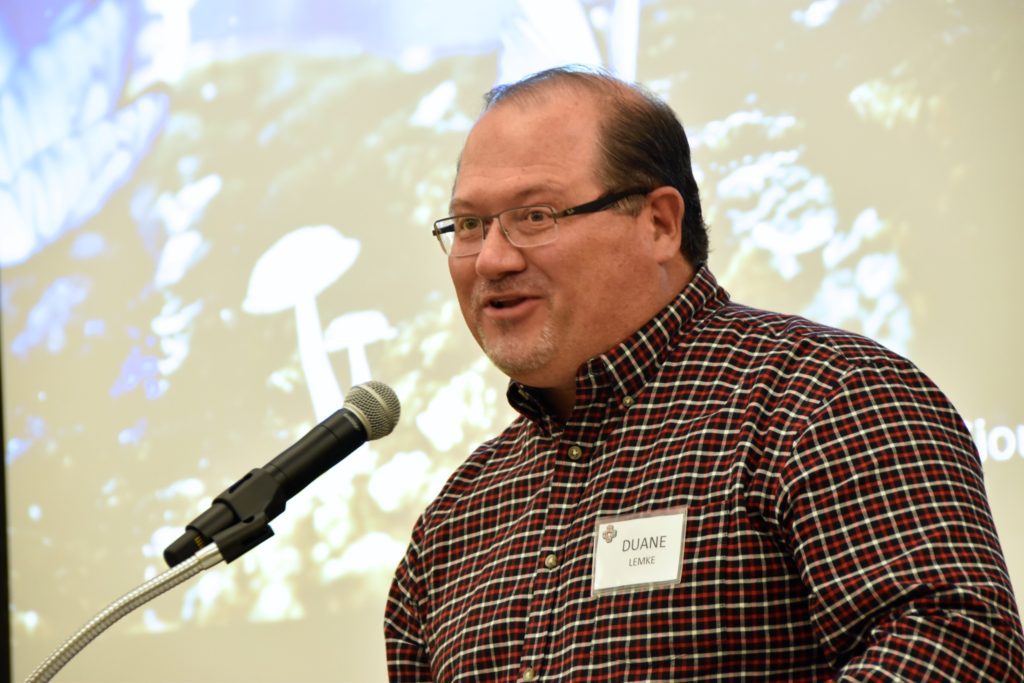
Opening our eyes to the victims of immigration
Barbara Graham, Director of Legal Services for Immigrants for Catholic Charities Milwaukee, gave a presentation on human trafficking. She noted the “red flags” to be aware of; to be mindful that often victims are hidden in the open. Br. Duane Lemke, SCJ, echoed Barbara’s words when he spoke of his shock in learning that human trafficking had been going on for years in his home state of South Dakota, in particular, in a spot not too far from where the SCJ community often gathered.
“I thought that trafficking was something that happened in New York City, in other countries, not Oacoma, SD,” said Br. Duane. “I was profoundly saddened that I wasn’t aware. I could have done something if I had only been more alert.”
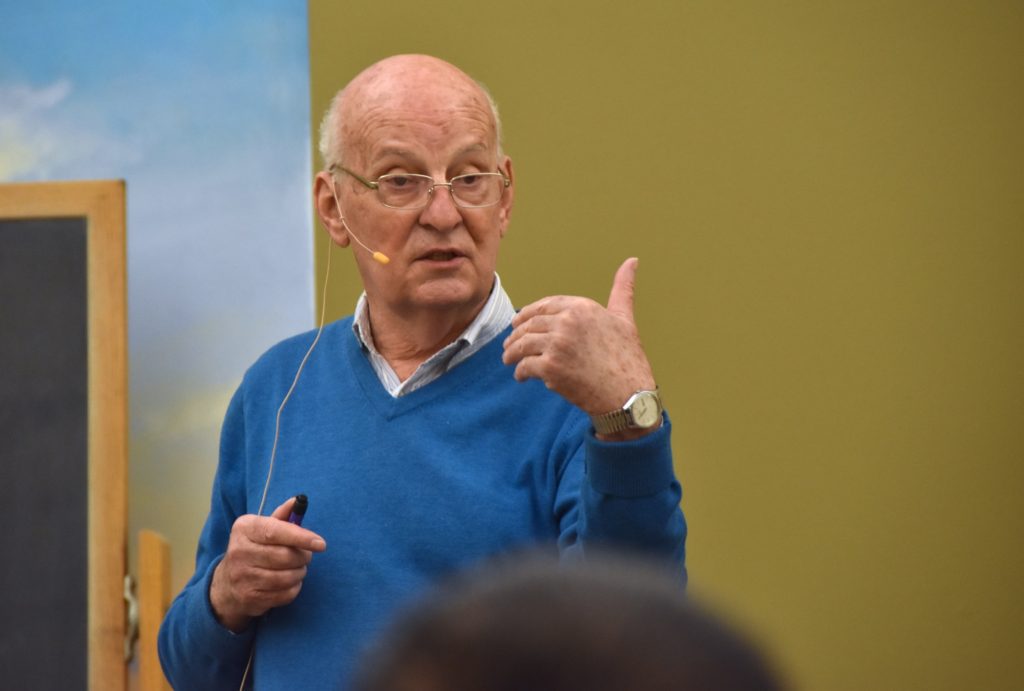
Welcoming each other in community
“It is easy to describe interculturality in 10-15 minutes,” said Fr. Anthony Gittins, CSSp. “But intercultural living, that is a lifetime commitment. And not just one lifetime, but a succession of lifetimes. However, if we don’t attempt intercultural living, there will be no future for international religious communities. If we can’t learn to live together, we will fall apart.”
Fr. Anthony is author of the book Living Mission Interculturally. A social anthropologist, he has taught theology and anthropology for 30 years in London and Chicago and is now emeritus professor of theology and culture at Catholic Theological Union, Chicago. He also served for ten years as a missionary in Sierra Leone, West Africa.
For a day-and-a-half, Fr. Anthony spoke to SCJs about intercultural living, “something radically different than living in an international community,” he said.
“Intercultural living is not a problem, he emphasized, “but a challenge, an opportunity.” Instead of an “us” and “them” mentality, there is only a “we” for those who take on the challenge of intercultural living.
He spoke of older models of international welcoming which emphasized assimilation: a dominant culture was very happy to welcome an international member as long as that person worked toward adopting and conforming to his host culture. But that has changed. Intercultural living requires conversion and hard work. “Good will is not enough,” said Fr. Anthony. “Intercultural living is not natural, but it is possible… We are called to live with and through our differences, not in spite of them.”
He added that intercultural living requires a common project, but not in the sense of a particular shared ministry. “The common project in this sense is something which we strive for as a glimpse of God’s vision that we follow together intentionally,” said Fr. Anthony. “The common project is our life’s work, our attempt to be faithful to our founding charism.”
Responding to that, Fr. John Czyzynski, SCJ, noted that the Rule of Life (No. 65) calls SCJs to be an example of what is possible in community: “Through fellowship even above and beyond conflicts, and through mutual forgiveness, we would like to be a sign that the fraternity for which people thirst is possible in Jesus Christ and we would like to be its servants.”
Fr. Anthony’s presentations were based on his book, Living Mission Interculturally. Click here to access it from Liturgical Press.
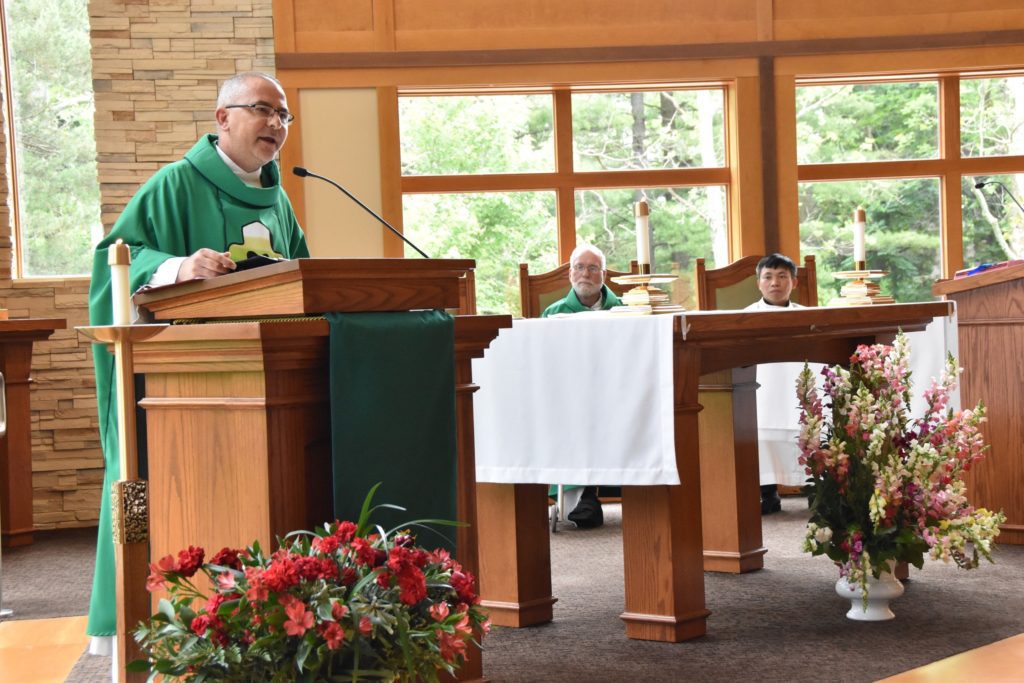
Final moments
The assembly also had a presentation by Praesidium, an organization that specializes in safety training and certification in regard to the protection of children and other vulnerable adults. Kathleen Dahlgren, province attorney, talked to SCJs about various legal documents, such as Power of Attorney for Health Care; Mary Gorski, province communications director, walked SCJs through the province website and other online resources.
The assembly evenings offered several entertainment options, including a mariachi band on Tuesday. Of course, prayer was woven throughout the days’ activities. On Thursday, SCJs gathered around the Sacred Heart Mausoleum to commemorate SCJs who had gone before them, and honor in a special way the five SCJs who died within the past year: Fr. Tom Burns, Fr. Bill Pitcavage, Fr. Leonard Tadyszak and Fr. Paul Kelly from the US Province, and Fr. Walter van As and Fr. Rein van Leeuwen of the Canadian Region.
The assembly concluded Friday morning. In his homily at the Closing Mass, Fr. Andrzej Sudol, SCJ, reminded Dehonians that “Intercultural living begins with hospitality, with a sense of welcome. When we enter someone else’s culture we learn a lot about each other, and a lot about ourselves. Hospitality changes us. As a missionary I was touched and humbled by the hospitality of others. Hospitality is in our charism as SCJs. This US Province has intentionally chosen to be intercultural, multicultural. It has chosen to offer hospitality to others. This assembly has been a banquet of hospitality and I am grateful.”
Hosted by the US Province, the assembly included SCJs from both the United States and Canada.
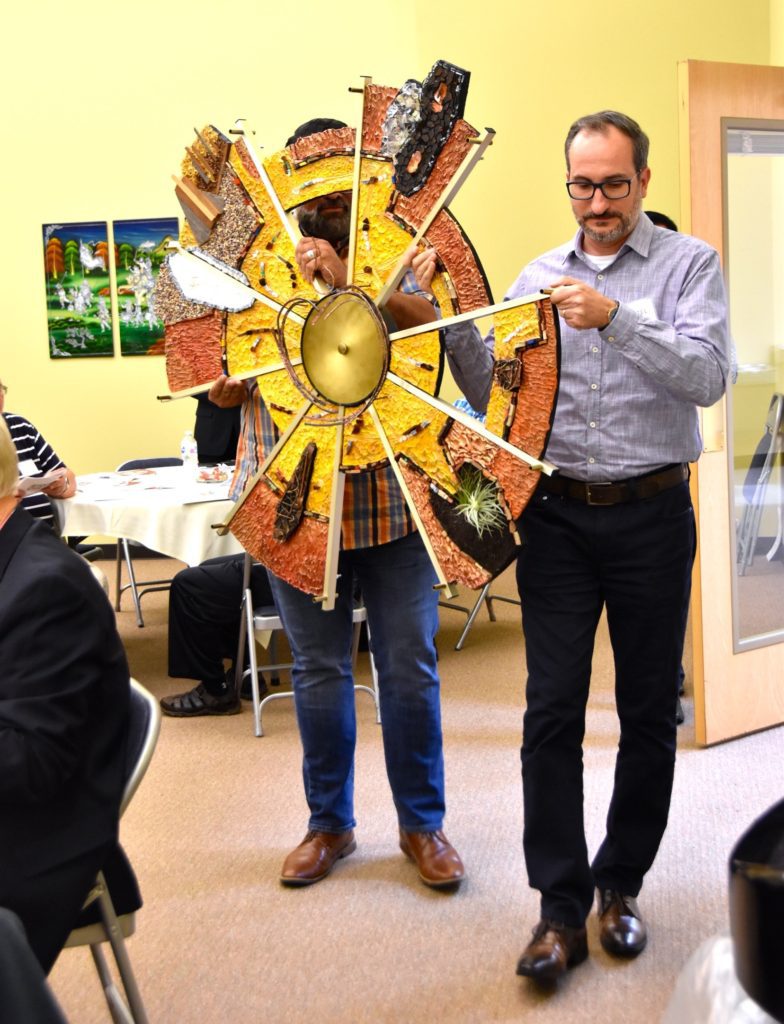
Assembly logo
Br. Duane Lemke, SCJ, was commissioned by the Assembly Planning Committee to create a piece of art for the gathering. It is pictured above. His artist statement:
“My commission was to create a piece that represents multiple cultures interacting and creating something new. Artistically, I’ve been drawn toward multimedia. My relationship with the viewer (you) is to use color, media and perhaps symbol to suggest and hint, but deliberatively not to lead you toward particular thoughts or conclusions: you must have room to interpret for yourself.
“I am willing to express the starting point of this piece. I have made use of multiple media elements to suggest difference: wood, glass, stone, metal, paint, paste. If course, the primary symbol is the Sacred Heart. The circular frame has multiple symbolic possibilities. It is near the Heart of Christ that color becomes more vibrant, the light becomes brighter, and movement more fluid. It is near the Sacred Heart that different media interact and mix.”
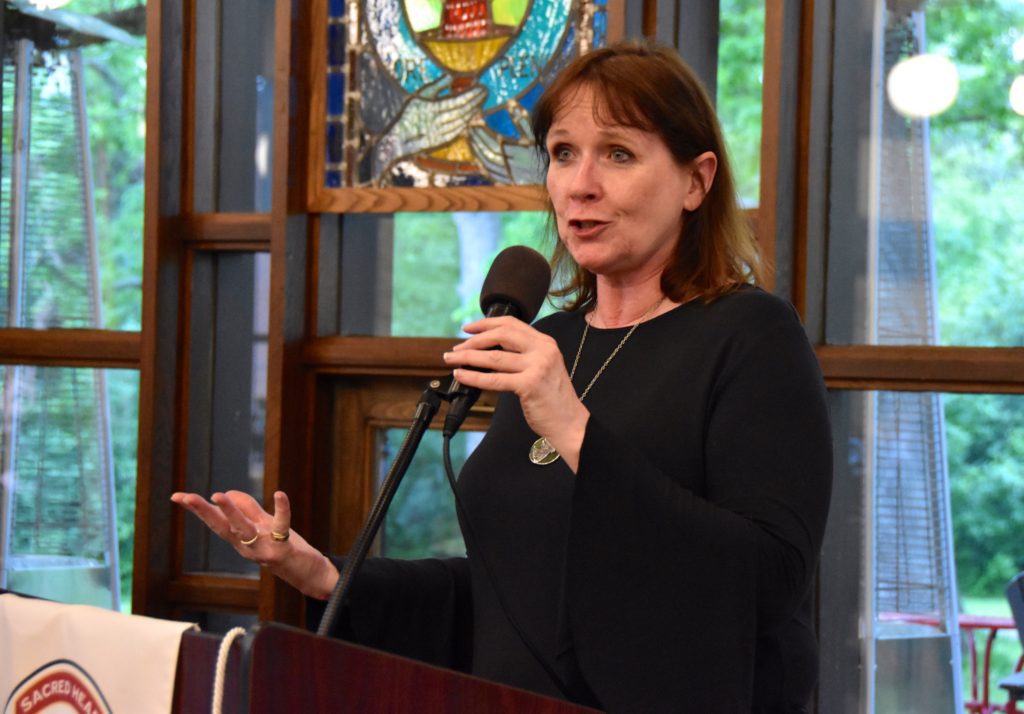
Fr. Johnny Klingler Social Action Award
As noted earlier, Barbara Graham, Director of Legal Services for Immigrants for Catholic Charities Milwaukee, gave a presentation on human trafficking during the assembly.
During the Assembly dinner on Tuesday, she was awarded the Johnny Klingler, SCJ, Social Action Award for her work with migrants and refugees. The award was established two years ago to honor a former Provincial Superior and the first Director of Justice and Peace for the US Province.
Graham has a caseload of about 4,000 clients and manages it with only five staff attorneys and two paralegals, many of whom she recruited herself out of Marquette University’s Law School. They defend both legal permanent residents, and those without papers, from deportation. The office represents 700 DACA clients – those who came here as children and know no other country as home. Graham’s team assists with asylum claims, including victims of domestic abuse, and helps reunite separated families. They help new arrivals obtain permanent legal residence and eventual citizenship, help newly-resettled households integrate into the community, and do outreach via social media and YouTube.
Reunion of former SCJs and students
Overlapping with the Province Assembly was the reunion of former SCJs and students. The reunion began with a presentation by Fr. John Czyzynski, SCJ.
“I left home two weeks before I turned 14 and now I am 81 years old and have been a professed SCJ for almost 63 years,” said Fr. John. “I left home to become a priest and I have grown into being a religious, a Priest of the Sacred Heart. Through the years the men I met who taught me or were somehow a part of my growing up helped me to get to know the God they were committed to: the Sacred Heart of Jesus. I could relate to Jesus as I came to know Him with the Priests of the Sacred Heart. And that must be true for all of you who are here. That is why you are here today: the spirituality that we were taught and saw lived out.”
Click here or on the image above to view a video of his presentation.
PHOTOS: click here to view photos from the assembly
